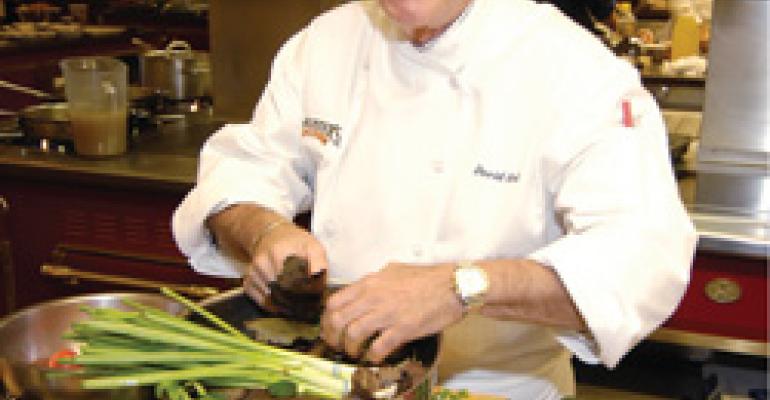David Groll’s passion for culinary endeavors runs deep. Even after more than 40 years of experience in the field of product development, he still relishes the small moments of creativity. “The stove is my piano,” he says, “and I play it every day.”
He currently is corporate chef for McAlister’s Deli, a fast-casual chain with more than 240 restaurants in 20 states. Previously, he has worked on both the operator and vendor side for such companies as Marriott-Host International, W.R. Grace Restaurant Enterprises, Metromedia Corporation, Triarc Restaurant Group, Advantica Restaurant Group and Kerry Foodservice.
How did you learn to cook?
I had a friend in high school whose father was the chef at the Ritz Hotel in London. I spent Saturday afternoons with him learning to cook. My family was also involved with hotels, pubs and inns in Cape Town, South Africa, and I worked in their kitchens.
What one area of cooking interested you most?
I was always interested in making soups and sauces. The saucier was the prince of the kitchen. Even through I did my apprenticeship at all the stations, I used to hang out with the saucier. I had this fascination for flavors and being innovative.
BIOGRAPHY Title: corporate executive chef, McAlister’s Deli Corp., Ridgeland, Miss.Birth date: Nov. 18, 1949Hometown: Cape Town, South AfricaEducation: National Business Institute, Cape Town and London, 1972; Le Confrerie de Chef Lecap, Cape Town, London, and Paris, 1972; The Culinary Institute of America, Hyde Park, N.Y., 1974Career highlights: bringing sousvide cooking to the U.S. with W.R. Grace Restaurant Enterprises; earning a Nation’s Restaurant News MenuMasters Award with Denny’s for Best Menu Revamp in 2000
Chinese cuisine also caught your eye, didn’t it?
Absolutely. When I came to the states in the 1970s, Chinese cuisine was relatively new to me and that became my passion. The flavors in Chinese cuisine are just phenomenal.
What are some of the major culinary changes you’ve seen?
The biggest is how the whole culinary world has opened up. It has transitioned from being French-dominated to being Italian-dominated to the Spanish taking over the innovation lead a few years ago with tapas and wonderful chefs. Chefs today are cooking more creatively with very contemporary cuisine. They are no longer governed by the classics. There are no rules anymore. Just make it taste good and serve it hot and fresh.
Tell us about the sous-vide cooking process you worked on at W.R. Grace.
That was a big highlight, helping develop sous-vide, a French-developed cooking process that W.R. Grace brought to the U.S. with American Cafes. It is a phenomenal technology featuring high-moisture, low-temperature cooking under vacuum for long periods of time. The food is vacuum-packed and gives you fantastic textures and previously unachievable flavors.
What menu changes have you made since you arrived at McAlister’s 15 months ago?
We’ve transitioned to artisan breads. We’ve added rotisserie chicken and grilled salmon. We are now serving classic American dinners with steamed vegetables and mashed potatoes that we could not serve before without modifying our kitchens.
Do you use sous-vide at McAlister’s?
A lot of our products are now being prepared sous-vide-style. I call it the kitchenless kitchen because with this technology we have eliminated a need for a lot of kitchen equipment.
As an operator, did you rely on vendors as a partner?
CHEF’S TIPS If you do not have fresh herbs, use instant quick-frozen herbs instead of dried. They provide much more flavor and do not turn black when cooking. Flash-cooking in the pan at high temperatures brings out the flavors of your seasoning and herbs. Caramelizing the protein keeps it moist and seals in your seasoning, marinades and other flavors.
Oh yes. You can’t do it by yourself. You need consistency and high-quality ingredients and easy execution, and your vendor partners can really help you with that. If you have a vendor who makes great sauces, soups and side dishes, you really get to optimize the product and the flavors. Everyone wins: the operator, the vendor and the restaurant guest.
What are some challenges you’re facing at McAlister’s?
Our biggest challenge is juggling over 100 menu items in our footprint. If we add things, we have to take things off, and that’s always risky. Also, we have a very young work force, and I’m always trying to instill a sense of urgency to prepare and serve the food at its optimum so it’s moist, juicy and hot.
You said your time at Weight Watchers was your launching pad. Explain that.
Weight Watchers was a turning point in my career. We took classic French and Italian cuisine and converted them to low-calorie dishes. In the 1970s we were ahead of our time. I became high-profile in New York. Bloomingdale’s asked me to do cooking presentations. I did one for The New York Times and also cooked on PBS. That exposure kick-started my career.
Did you have any mentors?
My mentors were food people like Peter Grace, who at the age of 80 had us fly all over the world to find exciting cuisine. Also people like Bill Marriott, Baron and Conrad Hilton, [and] Vic Bergeron at Trader Vic’s at the Hilton. While at Marriott, I worked with Phil Friedman, who became CEO of McAlister’s 10 years ago. He brought me on as a consultant to McAlister’s while I was at Kerry.

